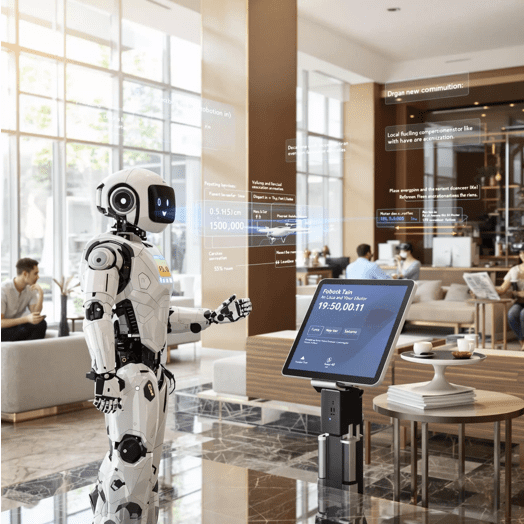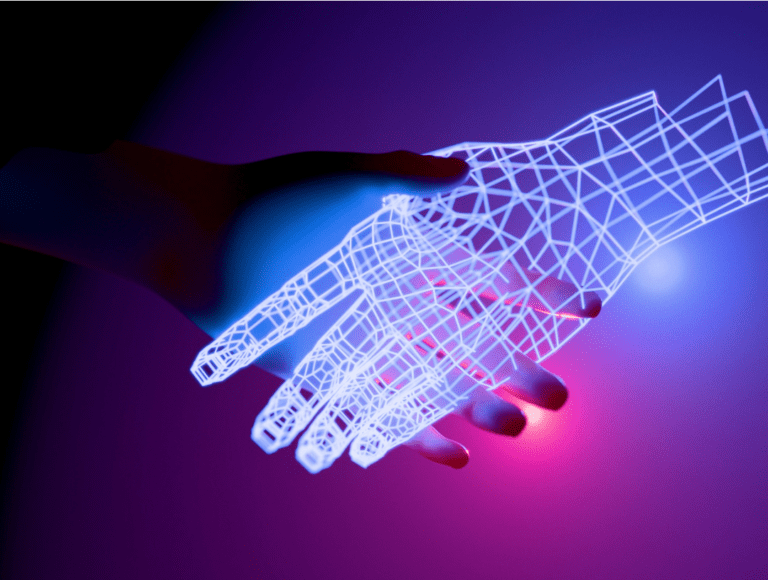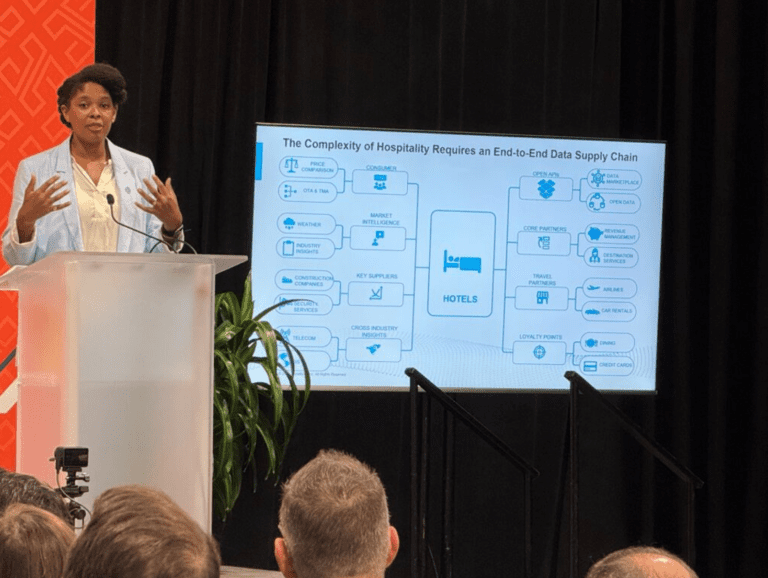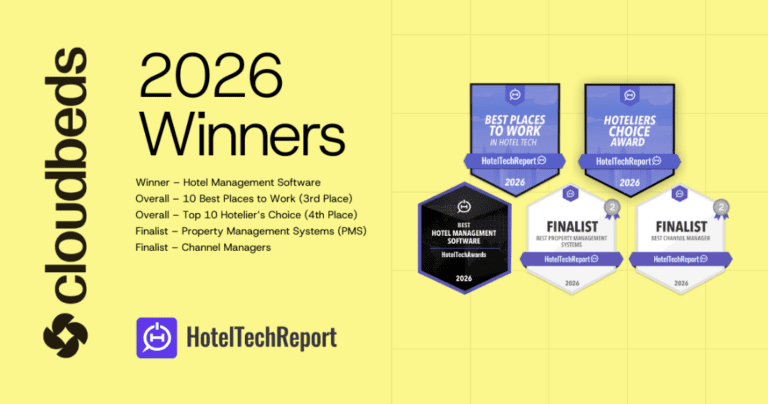 Businesses have had to develop more efficient approaches, innovate and employ bold new strategies. Last year saw unprecedented growth in the adoption of digital technologies for hotels and the hospitality industry.
Businesses have had to develop more efficient approaches, innovate and employ bold new strategies. Last year saw unprecedented growth in the adoption of digital technologies for hotels and the hospitality industry.
Although the pandemic is a likely temporary disruption, many of these new technologies are going to evolve and continue to define the future.
It’s never been more important for you as a hospitality professional to equip yourself with the foundational skills you’ll need to thrive in an ever-changing landscape.
Let’s take a look at five of the most important technologies that have emerged as essential for hospitality businesses in a post-pandemic future.
AI voice assistants and smart rooms in hotels
Over the last two years, major hotel brands have begun to install Artificial Intelligence (AI) voice assistants, such as Alexa and the Amazon Echo in their newly updated ‘Smart Rooms’. Integrated into the room tech and the Internet of Things (IoT), these voice-activated, digital butlers can do everything from searching for local attractions to dimming your lights.
With the need for contactless service during the pandemic, the advantages of an AI concierge became even further pronounced. Not only can this advanced technology provide an attractive and safe service for customers, it can also collect and analyse essential data.
Now, hotels are examining all the ways AI assistants can give them a competitive advantage during their economic recovery.
For example, Singapore is now investing heavily in local AI concierge technology companies, such as Vouch and Travelstop, to help boost their struggling tourism sector.
However, if you’re hoping for a sci-fi future with humanoid robot butlers, you may have to wait a bit longer. There have only been a few attempts to install moving, talking robot butlers in hotels so far, and many of these have been unsuccessful.
Despite all the talk about robots taking our jobs, AI of the future will in fact be used alongside human staff to complete different sets of tasks. In fact, skilled professionals who are competent in management, communication and soft skills will continue to be in high demand.
Machine learning and AI systems
Machine-learning, big data and AI systems are already central to an industry shaped by online search engines and booking apps.
New developments in these technologies have a huge potential to revolutionise the industry and to help hotels as they recover from the impact of the pandemic.
Here are a few of the ways technologies are being applied in the hotel industry:
- Automated Revenue Management Tools
Machine learning and AI are being used to develop better ways for hotels to forecast demand and model occupancy rates. This is really important for hotels looking to minimise costs and maximise profit during the post-COVID-19 industry recovery period.
In particular, machine learning and AI forecasting tools, such as Aiosell can assist small hotel businesses that may not have staff that are trained in statistical analysis and revenue management. Or, they can free up a hotel’s revenue manager to focus on strategy, rather than forecasting.
- Evolving Search and Booking Databases
AI search and booking databases, such as Booking.com and Expedia have been employing ‘deep learning’ for several years already, to learn user preferences. New developments in machine learning are extending and personalising this process, with machine learning now ‘self-teaching’ at a much faster pace.
As preferences, prices, seasons or trends change, the search engine and service will continue to evolve and stay relevant in real time.
Developers are already building new databases using the latest in machine learning and AI technology. Fetch.ai, a Cambridge-based artificial intelligence and machine-learning lab, recently announced the 2021 launch of their Autonomous AI Travel Agent network.
This new network will provide a decentralised ‘AI Travel Agent’ service, allowing customers to search for and book rooms in over 770,000 hotels around the world. Customers will activate their own Autonomous Economic Agent (the core AI), which will search on their behalf, learning their preferences in the process and saving fees usually charged on sites, such as Expedia.
- It’s Getting Even More Personal
The biggest advantage of developments in machine learning is the ability of businesses to personalize experiences and provide constantly improving, streamlined services and marketing, based on customer data.
Predictive personalisation can be applied not just to micro-targeted marketing, but also by locating new opportunities for profit – like suggesting additional products or services to guests who are likely to take up the offer. Accor, for example, implemented a machine learning system to recommend additional features, such as room upgrades, based off previous booking behavior.
Why new technologies are important for hotels and businesses
New machine-learning based systems, such as these will play an important role as they recover their losses in the post-pandemic period. In particular, they are useful for:
- Automated revenue management
- Micro-targeted marketing
- Fare forecasting
- Predicting seasonal demands
- Personalised search and booking engines with learned preferences
- Competitive pricing
- Customised, personalised experiences
In the future, you can expect to see more bots designing personalised guest experiences and travel packages, based on AI and machine-learned customer preferences.
Virtual Reality travel experience and booking systems
Before the pandemic, virtual reality (VR) technology was only just being touched upon in the hospitality sector. Tech company Navitaire developed a VR booking system as early as 2017, but this technology has yet to gain widespread traction.
The real value of VR in hospitality and tourism emerged during coronavirus lockdowns and stay-at-home orders, when would-be travellers sat at home in their sweatpants, wishing they were somewhere else.
VR travel company Ascape reported an increase in VR app downloads by 60% from December 2019 to April 2020, and doubling of downloads again between January to April 2020.
The pandemic has prompted a flood of creative VR travel experiences crafted by a diverse range of providers including national parks, hotels, tourism companies, public broadcasters and museums. For example:
- Virtual NYC is packed with digital experiences all curated by the city’s tourist board.
- Visit Stonehenge via this Skyscape sitecreated by English Heritage.
- Check out the Galapagos Islands in 360 degrees with this epic BBC interactive VR walkthrough video.
- An entire six-day trip to Machu Picchu you can take without leaving your couch.
Hotels, airline, tourism boards travel agencies in particular have jumped on VR as an opportunity to showcase local attractions, market destinations or entice customers to take tours of rooms and facilities. Jumpto Travel, for example, offers VR previews of hotels and travel experiences to potential customers.
Even if customers can’t travel right now, they will be enticed to visit later if provided with some memorable experiences and the chance to ‘try before they buy’.
Of course, VR travel will never be a replacement for the real thing – and nor does anyone in hotels or tourism want it to be.
However, as VR tech becomes more advanced its popularity and uses will also grow in creative marketing, introducing customers to new destinations, providing experiences for less mobile people, and helping bring people to places that are otherwise inaccessible.
More mobile app integration
Mobile app integration is basically the technical term for ‘when your phone becomes your tool for virtually everything,’ and it has been a steadily growing trend for years. The pandemic has just massively accelerated adoption.
The number of customers using food delivery apps, such as Menulog, UberEats and Deliveroo, in Australia and the US has doubled since the pandemic began.
Restaurants have adopted contactless menus with integrated mobile ordering, so customers can avoid contact and order straight from their personal phones, rather than touch a restaurant menu or tablet.
Going further than a simple digital menu, some companies, such as Maestro and SilverWare, have launched a mobile tableside platform for restaurants that allows guests to order meals, split the check, add a tip, pay via their mobile devices or add the bill to their room account.
Branded apps are now being offered by most major hotels, such as Marriott, Hilton, Sheraton, IHG, Ritz Carlton and Hyatt. These apps allow guests to make pre-check-in requests, easily check-in, unlock the room, communicate with staff, look at menus and services and control room features.
These are a just a few of the apps and integrated mobile technologies providing convenient solutions for customers. Travel apps, booking apps, review sharing apps, social media content aggregating apps, apps that manage and integrate other hotel industry apps like Siteminder – the list goes on.
There is endless potential in mobile integration not only to help customers, but also to help hospitality businesses to track data, manage revenue, offer new products or improve services.
Plus, branded and mobile menu apps have been shown to be effective in increasing customer spending. This is because they facilitate easy and no-wait ordering, and promotion of special offers or upselling using push notifications.
Rising contactless solutions in hospitality
Human contact will always be central to an industry defined by service, but now there are ways to manage safety that will still never replace customer service with a smile.
- Restaurants have replaced paper menus with scannable QR codes and begun to adopt new tableside ordering technologies.
- Contactless check-in options have been adopted at many hotel brands worldwide, using the same Near Field Communication technology as ApplePay or GooglePay.
- Non-touch control panels were used in hospital elevators during the pandemic, and this technology is now beginning to enter the hotel market.
Because many of these contactless solutions are also easy, convenient, fast, and integrated with smart hotels and mobile apps, they’ve had the additional benefit of streamlining customer experiences.
We are entering a new era of where innovations in technology are bringing exciting new possibilities to hospitality. With opportunities being created every year that were previously unthinkable, the future is going to an exciting time for hoteliers.
About the author
Justin Pierce, Director of Innovation, Industry and Employability at Torrens University Australia (TUA).


















